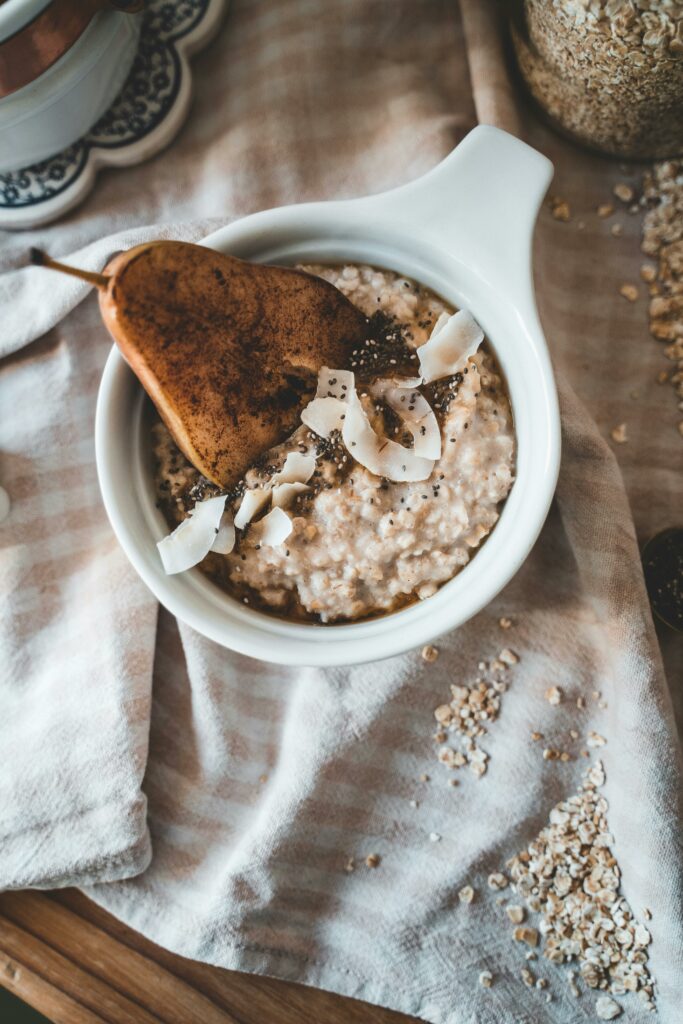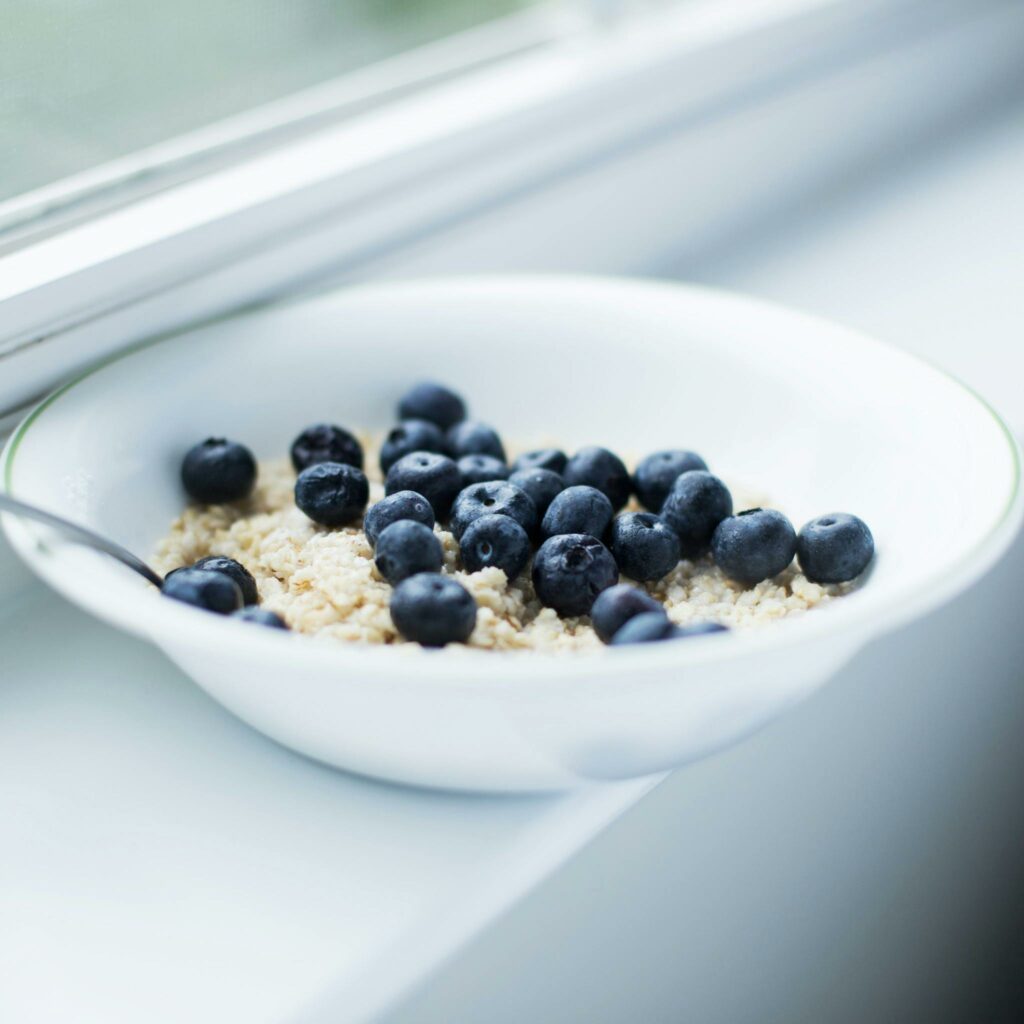Oatmeal has been a staple breakfast for many people for years. It is renowned as being easy to prepare, nutrient rich, inexpensive, and of course, delicious! But have you ever wondered is oatmeal good for IBS? Keep reading to learn the implications of eating oats for IBS.

What is IBS?
IBS is a gastrointestinal disorder characterized by chronic abdominal pain, variable bowel habits, bloating, and/or gas not caused by a detectable disease (1) (2). It is one of the most common gastrointestinal disorders, affecting up to 22% of people worldwide (2).
Nutritional Value of Oats
Oats are a whole grain rich in an array of nutrients including Vitamin E, folate, iron, copper, zinc, manganese, unsaturated fat, and fibre to name a few. It is also notably high in polyphenols which act as powerful antioxidants in the body (3). Unsurprisingly, oats have long since been promoted as a healthy choice.
Is Oatmeal Good for IBS?
Like many foods, individual responses to oats vary significantly for several reasons. First, some may respond well to oats because they are low in FODMAPs which are known to cause IBS flare ups.
Nonetheless, oats may still trigger digestive discomfort in some. One potential cause of adverse reactions is having a gluten sensitivity. Oats are typically exposed to wheat (and therefore gluten) during processing. However, uncontaminated oats are available and can even be consumed by most people with celiac disease (3).
More often, adverse reactions result from oats’ high fibre content, which can be difficult to digest even among those without IBS. For the majority, unwanted digestive symptoms from fibre can be avoided by increasing fibre intake gradually and by simultaneously increasing water intake. In the long term, fibre promotes digestive health, and is an integral component of a healthy diet and, therefore, should not be avoided.
Now, let’s explore the potential benefits of incorporating oats into your diet, particularly if you struggle from IBS!
The Benefits of Soluble Fibre in Oatmeal for IBS
Oats are distinguished among whole grains for their high content of soluble fibre (4). This fibre is primarily in the form of β-glucans which are a viscous (thick) fibre to which many of oats’ health benefits have been attributed (5). Viscous, soluble fibres, such as β-glucans are associated with greater symptom relief than other fibres in all three IBS subtypes: IBS-C (with constipation), IBS-D (with diarrhea), and IBS-M (mixed) (6) (7). Specifically, oat and β-glucan consumption has been linked to improved stool consistency, decreased abdominal pain, and decreased bloating (1) (2). Nursing home residents given oat bran even decreased their use of laxatives by 59% (1).

Furthermore, compromised intestinal permeability is believed to be another cause of IBS. One study randomized IBS patients to receive Lactobacillus in combination with oat flour. Participants who received this treatment exhibited decreased intestinal permeability compared to the placebo group, and also reported reduced abdominal pain (10). Although different types of fibre can strengthen the intestinal barrier, β-glucans may be more effective than other common dietary fibres (8). Overall, there is ample evidence that long term consumption of oats improves our gut microbiome, which can in turn reduce IBS (2).
The Benefits of Polyphenols in Oatmeal for IBS
Another mechanism through which oatmeal may support digestive health is by helping resolve gut inflammation, which is more frequent in IBS patients. Oats contain avenanthramides which are polyphenols that exert anti-inflammatory effects. They also suppress the growth of unwanted gut bacteria, further contributing to reducing dysbiosis (11). Moreover, the short chain fatty acid butyrate produced by bacterial fermentation of fibre has anti-inflammatory properties (4). Consuming oats increases short chain fatty acid production, hence promoting these anti-inflammatory benefits, as well as other desirable outcomes such as enhanced immune function, acidification of the gut to hinder growth of unwanted bacteria, and inhibition of cholesterol synthesis (2) (8) , metabolism textbook).
Together, this evidence supports that oatmeal is good for IBS because β-glucans and other components of oatmeal help restore a balance of good gut microbes, reduce inflammation, and reduce intestinal permeability.
Other Benefits of Oatmeal
In addition to its powerful role in digestive health, oats support the overall wellbeing of those with and without IBS alike. β-glucans reduce blood glucose level[s] and improve insulin response, helping prevent type 2 diabetes. Furthermore, β-glucans can lower blood cholesterol both in those with normal and elevated cholesterol levels in only 12 weeks (5). Oats may even possess anti-cancerous properties (3).

Incorporating Oats into your Diet
If you are able to tolerate oats, it is a wonderful idea to try to include them into your diet to obtain their vast benefits. If you are new to oats, start slow with small portions. You may also find it easier to digest cooked rather than raw oats, as raw oats are high in resistant starch which can aggravate IBS (12).
Luckily, oatmeal doesn’t have to be boring! You can choose between steel cut, rolled, and quick oats, any of which can be topped with your favourite fruit and nuts for added flavour and nutrition. There are also many ways to enjoy oats beyond porridge ranging from granola to pancakes to savory recipes like meatballs. For maximum benefits, try baking with oat bran because the bran contains the highest content of β-glucans.
Overall, enjoying oatmeal and other oat-based products are a great option for working towards a healthy gut and potentially even controlling IBS symptoms.
References
1. Thies F, Masson LF, Boffetta P, Kris-Etherton P. Oats and bowel disease: A systematic literature review. Br J Nutr. 2014 Sept 30;112(2):31-43. doi:10.1017/s0007114514002293.
2. Staka A, Bodnieks E, Puķītis A. Impact of Oat-based products on human gastrointestinal tract. Proc Latv Acad Sci B Nat Exact Appli Sci. 2015 Sept 1;69(4):145–51. doi:10.1515/prolas-2015-0021.
3. Rasane P, Jha A, Sabikhi L, Kumar A, Unnikrishnan VS. Nutritional advantages of oats and opportunities for its processing as value added foods – a review. J Food Sci Technol. 2013 Jun 17;52(2):662–75. doi.org/10.1007/s13197-013-1072-1.
4. Rose DJ. Impact of whole grains on the gut microbiota: The next frontier for oats? Br J Nutr. 2014 Sept 30;112(2):44-9. https://doi.org/10.1017/s0007114514002244.
5. Shen X, Zhao T, Zhou Y, Shi X, Zou Y, Zhao G. Effect of oat β-glucan intake on glycaemic control and insulin sensitivity of diabetic patients: A meta-analysis of randomized controlled trials. Nutrients. 2016 Jan 13;8(1):39. https://doi.org/10.3390/nu8010039.
6. El-Salhy M, Ystad SO, Mazzawi T, Gundersen D. Dietary fiber in irritable bowel syndrome (review). Int J Mol Med. 2017 Jul 19;40(3):607–13. https://doi.org/10.3892/ijmm.2017.3072.
7. Nagarajan N, Morden A, Bischof D, King EA, Kosztowski M, Wick EC, et al. The role of fiber supplementation in the treatment of irritable bowel syndrome. Eur J Gastroenterol Hepatol. 2015 Sept;27(9):1002–10. https://doi.org/10.1097/meg.0000000000000425.
8. Valido E, Stoyanov J, Bertolo A, Hertig-Godeschalk A, Zeh RM, Flueck JL, et al. Systematic review of the effects of oat intake on gastrointestinal health. J Nutr. 2021 Oct;151(10):3075–90. https://doi.org/10.1093/jn/nxab245.
9. Korczak R, Slavin J. Effects of oats and β‐glucan on Gut Health. Oats nutrition and technology. John Wiley & Sons Ltd; 2013 Nov 15;299–309. https://doi.org/10.1002/9781118354100.ch14.
10 Bednarska O, Biskou O, Israelsen H, Winberg ME, Walter S, Keita ÅV. A postbiotic fermented oat gruel may have a beneficial effect on the colonic mucosal barrier in patients with irritable bowel syndrome. Front Nutr. 2022 Dec 8;9. https://doi.org/10.3389/fnut.2022.1004084.
11. Zhang Y, Ni T, Zhang D, Liu H, Wang J, Sun B. Consumption of avenanthramides extracted from oats reduces weight gain, oxidative stress, inflammation and regulates intestinal microflora in high fat diet-induced mice. J Funct Foods. 2020 Feb;65:103774. https://doi.org/10.1016/j.jff.2019.103774.
12. So D, Yao CK, Gibson PR, Muir JG. Evaluating tolerability of resistant starch 2, alone and in combination with minimally fermented fibre for patients with irritable bowel syndrome: A pilot randomised controlled cross-over trial. J Nutr Sci. 2022;11. https://doi.org/10.1017/jns.2022.9.



Leave a Reply